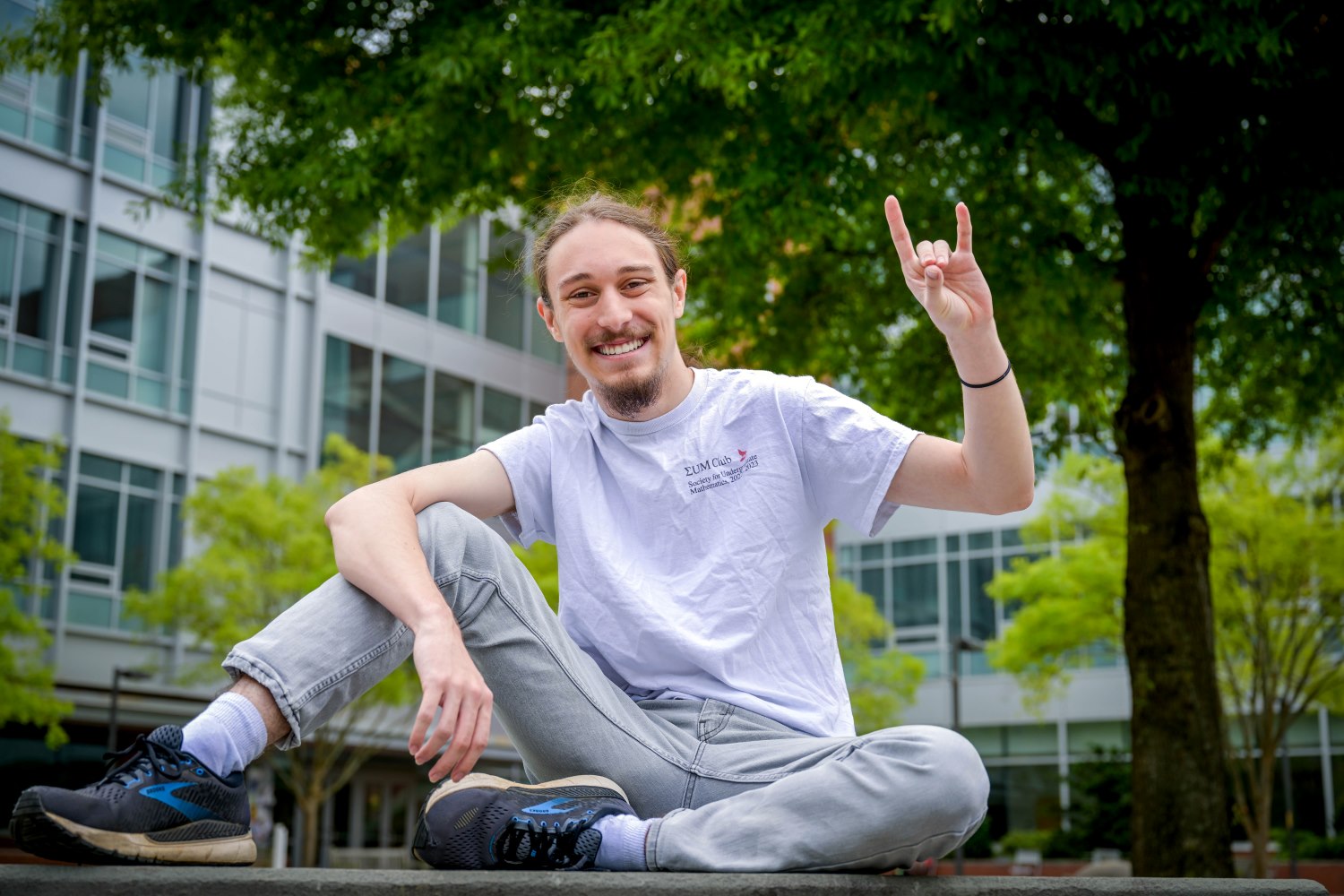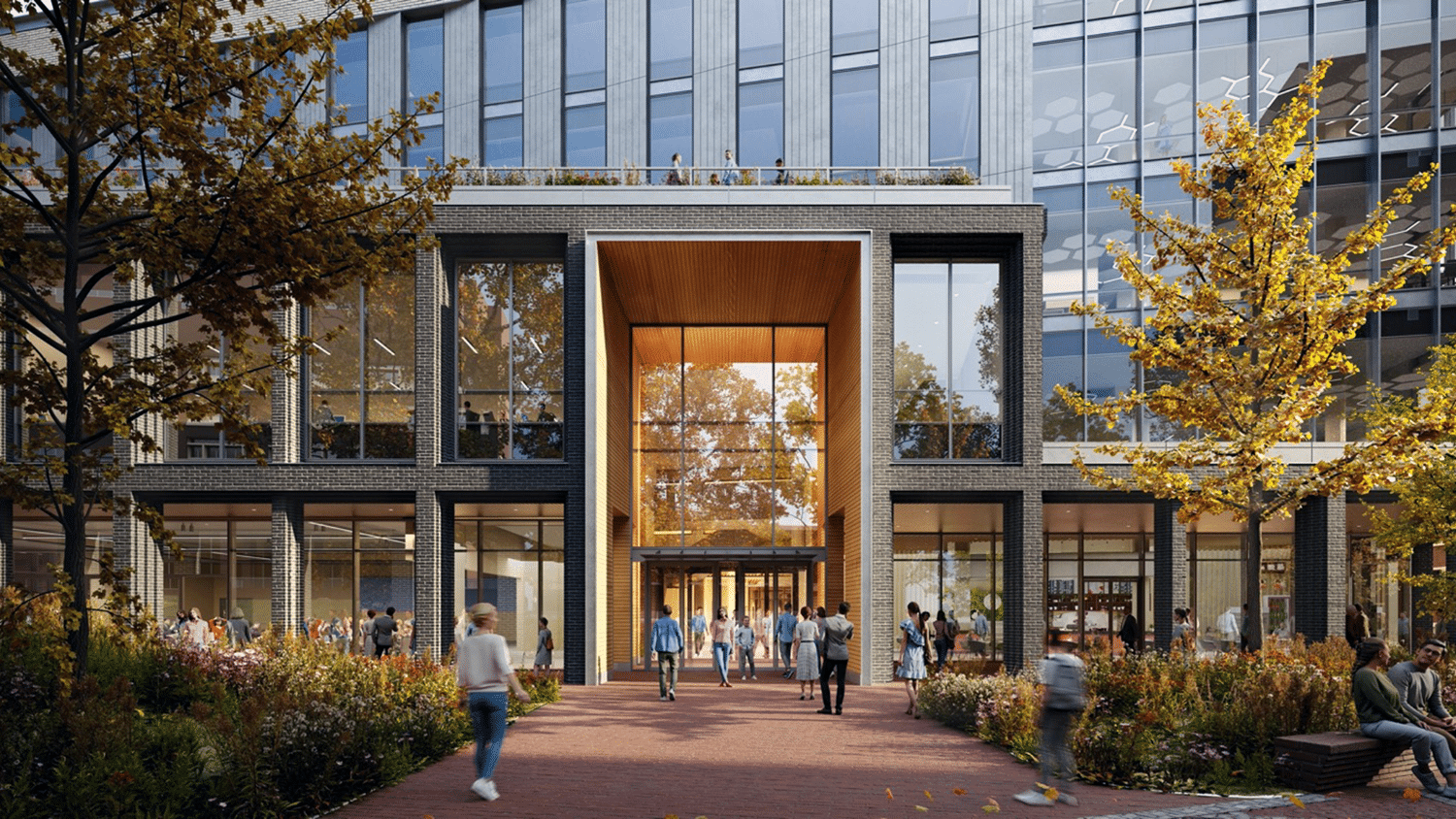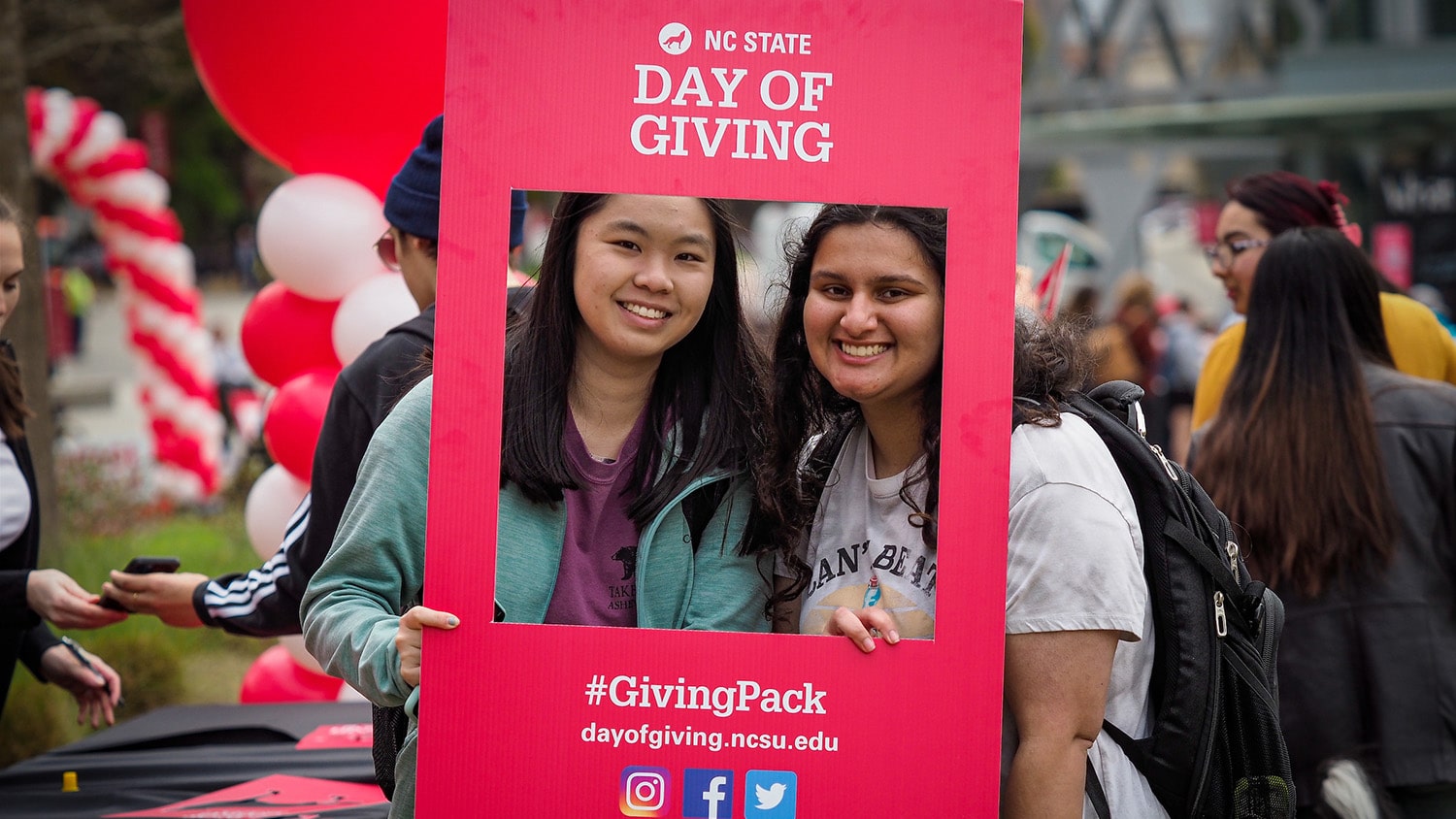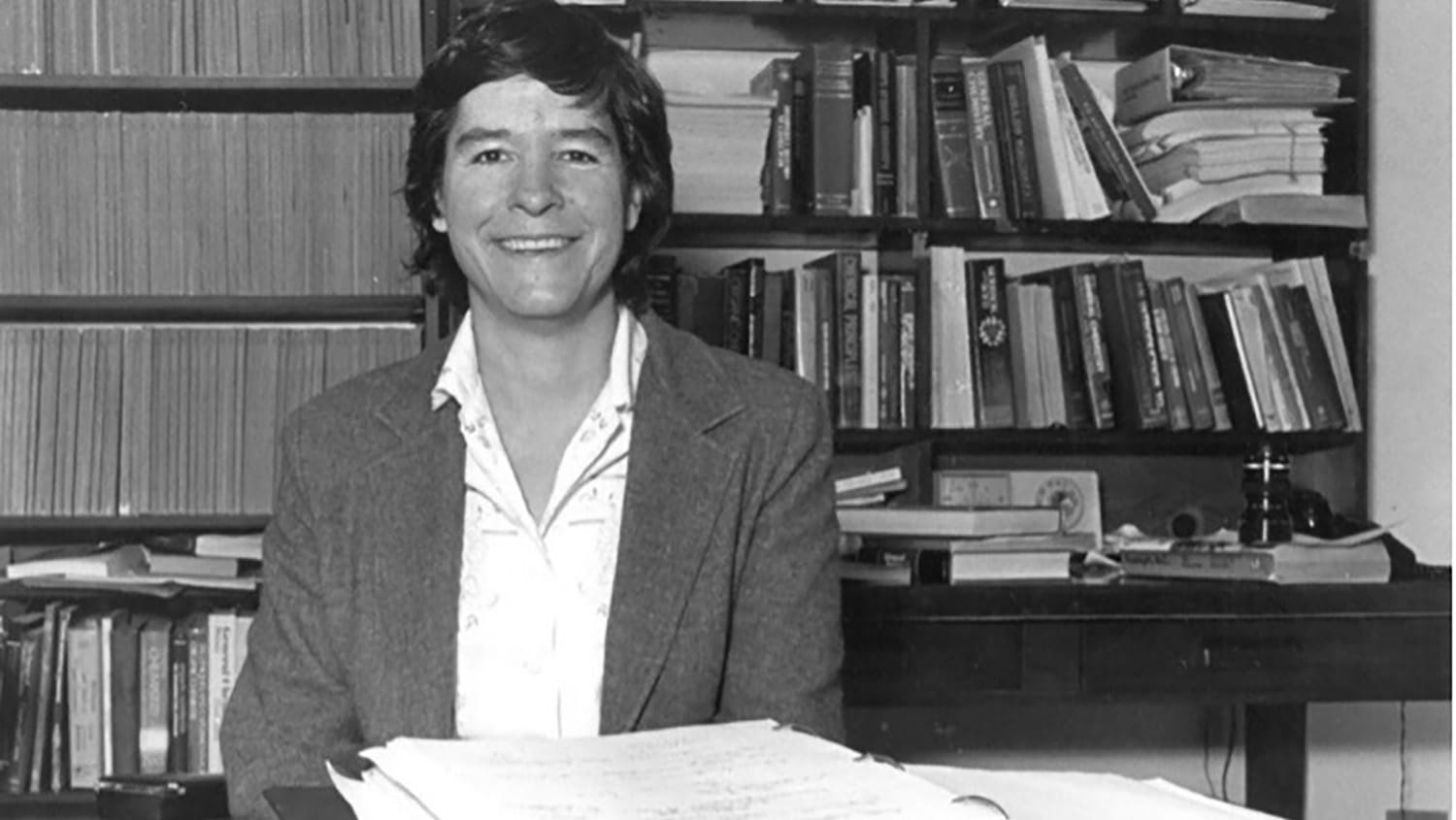Etienne Phillips is good at math.
No, not good. Very good, definitely. Great, perhaps.
As an NC State undergraduate, Phillips has excelled in graduate-level classes and research projects on topics that could make anyone less arithmetically inclined feel faint. Please consider: “Multivariate Fibonacci-like Polynomials and Their Applications” and “Poset Structure of Kohnert Diagrams.”
He has completed math internships, held math-related leadership roles on campus, and received awards and life-changing scholarships. He has tutored high school and college students in subjects like calculus, covering a small whiteboard with numbers and symbols while he explained enthusiastically over Zoom – camera and tripod positioned just so.
“It’s almost even more beautiful when you love something to see someone else starting to appreciate it too,” Phillips said – and math definitely is something he loves.
But the (figurative) distance he traveled to arrive at May graduation and the (literal) distance he soon will travel with commencement behind him, on his next stop toward a planned doctorate? Those lengths are more difficult to quantify. Even for a promising young mathematician.
Indeed, he has transformed his life so much that not long ago, a friend jokingly referred to him as “Etienne 2.0.”
“I want people to know that things are possible,” Phillips said. “You can go to graduate school. Wherever you are, whatever your situation, so much is possible if you’re committed and really motivated. Believe it and find the right support. There’s a huge discrepancy between my track record before NC State and at NC State, where I am now.”
Indeed, at a small charter high school in Asheville, Phillips was one of those students who made solid, not terribly noteworthy, grades without trying too much. He was living life, “just doing whatever,” he said. Few of the 30-odd classmates graduating with him planned to head to college.
“I was never really encouraged much as far as doing well in school,” he said. “If anything, I was encouraged against it.”
But he ended up applying to a few colleges, craving a broader view of the world.
Against the odds, Phillips headed to Guilford College to study psychology and had a great experience on the social side, making good friends and discovering a lot about who he is as a person. On the academic side, well, he realized that he really, really liked math.
“I didn’t enjoy math until I realized the creative part of math,” he said. “Someone had an idea in math and now you can explore it.”
Math in its purest form, Phillips decided, does not stand in stark contrast to all the humanities, like many people think. It resembles the discipline that ended up becoming his academic minor at NC State, philosophy – “except with a correct answer,” he joked.
Talking with faculty, he decided he would need to transfer from Guilford and pursue pure (vs. applied) math.
Enter, COVID-19.
While Phillips reconsidered his future, applying to NC State to pursue a dawning new dream, his Greensboro campus officially shut down following an extended spring break in March 2020. As a student solely responsible for financing his own education, the pandemic meant the loss of the college housing he relied upon.
Phillips spent time sleeping on the sofas and floors of friends and a sibling. After a few weeks, a friend’s father invited him to live temporarily with the family. Phillips was grateful for his own small room and bed.
As the months passed, he sat on that bed thinking, his resolve deepening.
“I had nowhere to go, no car, not much of anything going on,” he said. “I’ve got to do something, that was my thought process. I’ve got to join the military, or I’ve got to get to NC State. I’ve got to figure this out, I’ve got to do whatever it takes to make this work.”
NC State, he said in an earlier interview for the Beyond the Belltower podcast series produced by the university’s TRIO Programs, became his Hail Mary, his last-chance hope.
In August 2021, he gathered his limited possessions, found a ride to Raleigh and used his COVID-19 federal stimulus check toward a deposit on a place to live. He cobbled together financial aid and money earned through online math tutoring jobs that took up about 20 hours a week.
Phillips has been a fixture in SAS Hall since arriving on campus that fall semester. For months, he did little but math – on the Wolfline bus, in the SAS Hall lounge or at D.H. Hill Library as a weekend change of pace. Sometimes, intrigued, he’d start on a homework problem at 10 p.m. and work on it until 3 a.m., even though its due date remained a week away.
No one lucks into a tenure-track position as a math professor, which Phillips currently holds as his career goal. It takes a lot of dedicated time and hard work, but he did realize “24 hours a day, 7 days a week, 365 days a year of nonstop math isn’t sustainable.”
While he tried to refine more (OK, not always unrelated) hobbies like watching movies, playing board games and drinking coffee, he kept seeking opportunities to learn math and discovering faculty members who believed in him, including Betsy Alexis and Alina Duca.
One vital early conversation took place with Hoon Hong, who became his first math research mentor. Phillips constantly logged onto Zoom for Hong’s office hours to ask math questions unrelated to what he was studying in the professor’s linear algebra class – surprised few others were doing the same.
“One day, Dr. Hong said, ‘So, are you planning to go to graduate school?’” Phillips said with a laugh. “I said I was. He said that’s good, please, yes, do that. He taught me so much about things like writing precise research notes and about how, to be a mathematician, you need patience, humility and courage.”

Phillips has completed paid research projects through NC State as well as with advisors at Pomona College, University of Maryland-College Park and Michigan State. His campus activities have included serving as president of the Society for Undergraduate Mathematics and the co-organizer of the Putnam Competition problem sessions; he won the Levine-Anderson Award for a top-3 score.
He was inducted into Phi Beta Kappa; graduated with honors in math; served as a teaching assistant in math through the Provost’s Professional Experience Program; took part in the Ronald E. McNair Achievement Program for high performing first-generation undergraduates interested in pursuing research and grad school; and received the College of Sciences’ Student Excellence Award for academic achievement, research involvement and leadership in the college.
Life hasn’t been solely about Sard’s theorem, Kohnert lattices and combinatorics, of course. During college, Phillips also navigated health challenges, the death of a close friend and money worries.
Scholarships helped ease the latter weight: the Barry M. Goldwater Scholarship; the Howard A. Petrea Scholarship; the Mary Alice and Hubert V. Park Scholarship; and the Goodwin-Meissner Scholarship.
He vividly recalls the first time he bought a few groceries without carefully calculating every penny before reaching the checkout line.
The staff at TRIO, which help students overcome class, social and cultural barriers to education, helped him navigate things like applying for federal SNAP (Supplemental Nutrition Assistance Program) benefits.
He developed a new public voice to help process what he terms an unusual childhood and its lingering trauma.
Phillips, for example, gave a TEDx Talk that explored how conspiracy theories – vividly embraced by the single father who raised him – shaped and limited his childhood world.
He also has gotten involved in efforts to address housing insecurity, volunteering for Habitat for Humanity and serving as a public ambassador for NC State’s fledgling HOST (Housing Options for Students Today) initiative.
“I started talking about the struggles I’ve faced because I wanted people to find out how far I’ve come,” he said. “I want to help others understand that they can overcome things too. As I’ve gained perspective, I’ve become more open about things in a way that is actually therapeutic.”
Phillips, indeed, has become a regular at speaking publicly about life as well as math. What does he tell other students?
Get out of your bubble. Have respectful discussions with people with whom you disagree. Take a broad view of your education and don’t let the pressure of other people or the “conventional path to a job” limit your goals. Find what you love.
Most of all, don’t be someone who never tries. Embrace both failure and success, undaunted.
Phillips next will head to graduate school, to much more math, at the University of California at Berkeley.
“I struggle a lot about wanting to do more to uplift other people,” he said. “I wouldn’t even be here without scholarships. Hopefully, as I continue on my journey, I’ll be able to keep doing more and more.”
This post was originally published in Giving News.
- Categories:



